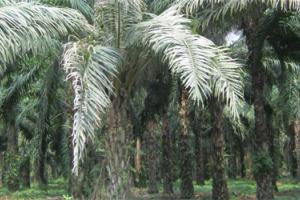Industrial monoculture oil palm plantations have expanded significantly in Guatemala in recent years. One of the areas that has seen the greatest increase in these plantations is the municipality of Sayaxché, Petén, where companies have determined that the land is optimally suited for oil palm production.
Large-Scale Tree Plantations
Industrial tree plantations are large-scale, intensively managed, even-aged monocultures, involving vast areas of fertile land under the control of plantation companies. Management of plantations involves the use of huge amounts of water as well as agrochemicals—which harm humans, and plants and animals in the plantations and surrounding areas.
Other information
30 May 2013
Bulletin articles
30 May 2013
From May 26-June 1, the International Tree Biotechnology 2013 Conference took place in Asheville, NC. This conference is a gathering of genetically engineered tree proponents and scientists. The Campaign to STOP GE Trees together with Join Earth First! and Global Justice Ecology Project had called to Resist the Tree Biotechnology 2013 Conference and carried out a week of resistance to genetically engineered trees.
Bulletin articles
30 April 2013
Uganda like many other African countries is in the campaign drive of promoting plantations under the guise of creating income and other benefits for Ugandans, destroying a lot of natural resources including forests, wetlands and up hills. In the past ten years, thousands of hectares of forests have been destroyed and replaced by monocultures.
Bulletin articles
30 April 2013
The indigenous network ALDAW in the Philippines(Ancestral Land/Domain Watch) is deeply concerned about the findings of a recent study it carried out in Southern Palawan. The research shows that oil palm development is impoverishing local indigenous communities while destroying biologically diverse environments. The ALDAW case study “The Palawan Oil Palm Geotagged Report 2013.
Bulletin articles
30 April 2013
The certification of industrial tree plantations by the Forest Stewardship Council (FSC) has served as a tool to legitimize the large-scale monoculture plantation model. The FSC’s internationally recognized certification scheme is supposed to ensure consumers that the companies that have been awarded its “green” label practise “environmentally appropriate, socially beneficial and economically viable” forest management.
Bulletin articles
30 April 2013
Genetically Engineered Eucalyptus Plantations Threaten Communities and Forests Around the World
Bulletin articles
30 March 2013
1. Introduction
Other information
30 March 2013
Since last March 18, workers of the pulp mill Veracel, a company equally the Swedish-Finnish Stora Enso and Fibria of Brazil, started an unlimited strike due a deadlock in the salary negotiations for the period 2012-2013.
The strike also unveiled a facet cruel Finnish transnational: the company does not recognize most of the occupational health related diseases, mainly in the field of mechanical harvesting.
Veracel entered, on March 20, a lawsuit against the union, trying to criminalize the strike and that the Justice declare the strike illegal.
Other information
30 March 2013
A group of eleven Finnish and international NGOs has filed a complaint to the UN Human Rights Council about human rights violations in connection to Stora Enso's eucalyptus plantations and planned cardboard factory in Guangxi that led to land conflicts with two reported deaths and multiple episodes of violence
The UN's Global Compact (an initiative for increasing social responsibility of corporations which Stora Enso has signed) requires Stora Enso to respond to allegations by 11 April.
Other information
30 March 2013
ALDAW has just launched a massive campaign against oil palm expansion. A petition launched through care.org is addressed to the National Government. A second petition, launched through Change.org, is focused on Palawan and it is addressed mainly to the Provincial Government, to the Palawan Council for Sustainable Development (PCSD) and to the National Commission on Indigenous Peoples (NCIP).
Other information
30 March 2013
The Norwegian Government Pension Fund Global (GPFG), one of the world’s biggest investors in the palm oil industry, has found that the activities of Wilmar International Ltd, Astra International Tbk PT and 21 other oil palm companies are incompatible with the Fund’s policy on risk related to climate change and tropical deforestation. As a consequence all stakes in the 23 oil palm companies were sold in 2012.
Other information
30 March 2013
The US Department of Agriculture Animal Plant Health Inspection Service (APHIS) announced that it is voluntarily preparing an Environmental Impact Statement (EIS) regarding a petition to deregulate [legalize] the commercial sale of the first genetically engineered tree in the US, a freeze tolerant eucalyptus tree. Eucalyptus trees are not native to the US and are a documented invasive species. They are also highly flammable and known to deplete ground water. The freeze tolerant GE eucalyptus trees will be able to survive in regions too cold for their non-GE relatives.

